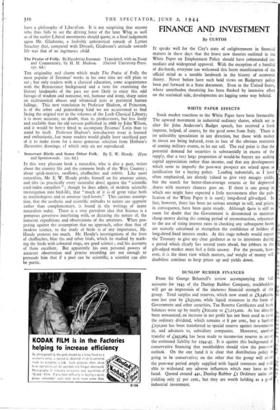FINANCE AND INVESTMENT
By CUSTOS
Ir speaks well for the City's state of enlightenment in financial matters in these days that the brave new theories outlined in the White Paper on Employment Policy should have commanded im- mediate and widespread approval. With the exception of a handful of die-hards, everyone has welcomed this latest manifestation of the official mind as a notable landmark in the history of economic theory. Never before have such bold views on Budgetary policy been put 'forward in a State document. Even in the United' States, where unorthodox theorising has been flanked by intensive effort on the statistical side, developments are lagging some way behind.
WHITE PAPER EFFECTS
Stock market reactions to the White Paper have been favourable. The upward movement in industrial ordinary shares, which set in after Sir John Anderson's Budget speech, has received a fresh impetus, helped, of course, by the good news from Italy. There is no unhealthy speculation in any direction, but those with money to invest are being induced, even in face of the obvious restraints of coming military events, to let out sail. The real point is that the potential demand for securities is substantially in excess of the supply, that a very large proportion of would-be buyers are seeking capital appreciation rather than income, and that any developments which seem to improte the post-war prospect are seized upon as justification for a buying policy. Leading industrials, as I have often emphasised, are already valued to give very meagre yields, but the search for better-than-average returns or for depressed shares with recovery chances goes on. If there is one group in which one might have expected a little nervousness after the pub- lication of the White Paper it is surely long-dated gilt-edged. In fact, however, there has been no serious attempt to sell, and prices, in consequence, have been quite steady. Although there is still no room for doubt that the Government is determined to maintain cheap money during the coming period of reconstruction, references to the use of rising interest rates in checking any subsequent boom are scarcely calculated to strengthen the confidence of holders of long-dated fixed interest stocks. At this stage nobody would expect the Treasury to give any clear guidance as to its intentions during a period which clearly lies several years ahead, but jobbers in the gilt-edged market must feel a little uneasy. For the present, how- ever, it is the short view which matters, and weight of money will doubtless continue to keep prices up and yields down.
DUNLOP RUBBER FINANCES
From Sir George Beharrell's review accompanying the full accounts for 1943 of. the Dunlop Rubber Company, stockholders will get an impression of the immense financial strength of the group. Total surplus and reserves, which now stand at £8,546,00e, rose last year by £643,000, while liquid resources in the form of Government and other securities, Tax Reserve Certificates and bank balances were up by nearly £800,00o to £7,215,000. As has already been announced, an increase in net profit has not been used to raise the ordinary dividend, which remains at 8 per cent., but a further £250,000 has been transferred to special reserve against investments in, and advances to, subsidiary companies. Moreover, another transfer of £943,964 has been made to income-tax reserve to cover the estimated liability for 1944-45. It is against this background of conservative financing that stockholders should view the post-war outlook. On the one hand it is clear that distribution policy is going to be conservative; on the other that the group will enter the post-war period amply supplied with liquid resources and well able to withstand any adverse influences which may have to be faced. Quoted around 44s., Dunlop Rubber Li Ordinary units are yielding only 31 per cent., but they are worth holding as a good industrial investment


























 Previous page
Previous page